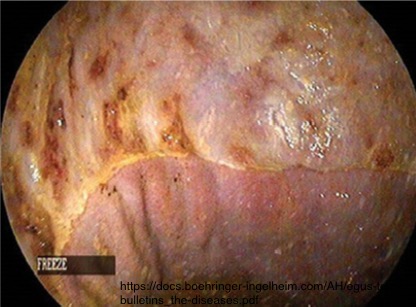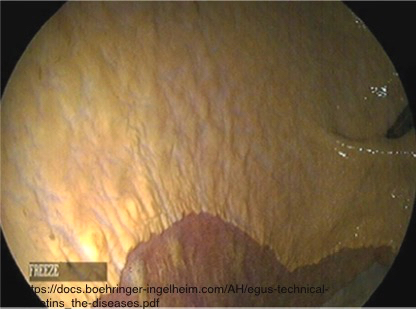So you think your horse has ulcers?
- Daniel Kish

- Nov 18, 2024
- 3 min read
What are they?
Ulcers are erosions in the tissue layers of the stomach and can be present in a range of severities.
The stomach is divided into two portions, the glandular and non glandular.
The term gastric refers to the stomach only.
The non-glandular area of the stomach is the top portion. Images of non-glandular gastric ulcers below:
The glandular portion is the lower part of the stomach and produces a mucous layer to protect it from stomach acid that it is in constant contact with. Images of glandular gastric ulcers below:
General Clinical Signs of Gastric Ulcers:
Repeat mild colic episodes
Poor hair coat
Behavioral issues
Weight loss
Poor appetite
Poor body condition
Potential Causes/Contributors to Gastric Ulcers:
Stress
Infrequent feeding or long intervals in between feeding
High grain/concentrate diets
Limited access to hay/forage
Intense training or competition
Limited access to water
Travel
How Do I Know if My Horse Has Ulcers?
While there are some generic and anecdotal ways to suggest the presence of gastric ulcers, the only way to definitively diagnosis ulcers is by having a gastroscope exam performed by a licensed veterinarian.
My Horse has Ulcers, Now What?
Gastric ulcers are often treated with a combination of prescription medications aimed at addressing the acidity of the stomach and helping the stomach tissue heal. These medications have been proven safe and effective in horses. Horses have a complex gastrointestinal system that differs significantly from humans or other domestic animals and the same treatment protocols may not be appropriate when applied to horses.
Treatment can sometimes take a long time, upwards of 30-60 days depending on the severity of the gastric ulcers.
There are numerous supplements on the market claiming to heal and prevent gastric ulcers. Fun fact, supplements do not have have any type of regulation or testing requirements prior to being sold, unlike prescription medications. Since they do not have any regulation requirements, there is no guarantee that the product is safe for horses or will even work! Supplements can potentially interfere with other medications that your horse is receiving and/or work in a negative way to create more problems digestively for a horse. Supplements can be expensive so when choosing one, it is highly recommended to discuss them with your veterinarian to ensure you are picking one that is in the best interest of your horse’s health.

How Do I Keep My Horse From Getting Ulcers?
There are things that can be done to help prevent the formation of gastric ulcers in horses such as environmental management, dietary changes, and certain oral supplements.
Encouraging as much turnout as possible helps keep the equine GI tract healthy by allowing a constant intake of forage and the production of saliva which act as buffers of stomach acid.
Feed the lowest amount of grain recommended per the manufacturer to fit with the horse’s lifestyle.
Spread the meals out throughout the day. Large grain meals can increase acid levels in the stomach and increase the risk of developing ulcers.
Allowing constant access to forage through a hay net to re-create pasture grazing can alleviate stress on grass during slow growing seasons.
Try to identify any stressors in your horse’s environment and work to alter the environment to reduce the impact of those stressors.
Limit the use of NSAIDs such as bute (phenylbutazone) and banamine (flunixin meglumine) to an as needed basis and/or when instructed by a veterinarian.












Comments